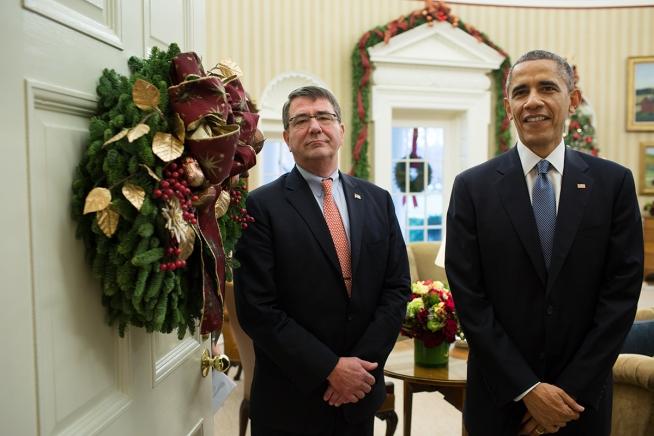 When I heard the successor to Chuck Hagel as ‘Sec Def’ was going to be Ash Carter, I couldn’t help but be a little interested. Carter is a friend and former dissertation committee member of my own dissertation chair Peter Feaver and as such I’ve heard him speak in person at Duke University during my days as a PhD student. His nomination is bound to excite commentary about what this means for US defence and foreign policy especially here in the Asia–Pacific. So I wish I had some telling personal anecdote about Carter that could shed light on this question. However, while Carter struck me as intelligent and capable, his talk was so ‘on message’ that it contained little memorable. Then it struck me—that illustrates exactly why it doesn’t matter much who’s in charge of the Pentagon.
When I heard the successor to Chuck Hagel as ‘Sec Def’ was going to be Ash Carter, I couldn’t help but be a little interested. Carter is a friend and former dissertation committee member of my own dissertation chair Peter Feaver and as such I’ve heard him speak in person at Duke University during my days as a PhD student. His nomination is bound to excite commentary about what this means for US defence and foreign policy especially here in the Asia–Pacific. So I wish I had some telling personal anecdote about Carter that could shed light on this question. However, while Carter struck me as intelligent and capable, his talk was so ‘on message’ that it contained little memorable. Then it struck me—that illustrates exactly why it doesn’t matter much who’s in charge of the Pentagon.
Don’t get me wrong, things would probably change if Noam Chomsky or Glenn Greenwald were appointed Secretary of Defense. But neither of them would ever get that far in the first place. In order to be considered for the position, you have to first build a career in the Washington DC policy community (essentially a revolving door of government jobs when your party is in power and think-tank positions when it isn’t). Getting such appointments involves holding (or, more cynically, acquiring) views that are congenial to major donors both to think tanks and political campaigns, especially from the defence industry. That would weed out a Chomsky or a Greenwald right there. Of course, in order to advance to Defense Secretary, you’d need to get the approval of the President. The President for his part needs to win his party’s nomination and then the White House itself. That in turn involves getting funding from key financial interest groups and votes from the public. Presidents aren’t going to employ Defense Secretaries that conflict with either of those two goals. Individuals who deviate too far from donor interests and public opinion—whether it be in a more hawkish or a more dovish direction—simply won’t be in contention. That’s why Carter’s talk at Duke struck me as so bland. He didn’t want to say anything that could be used against him by the media or Congress should he end up in the position in which he now finds himself—frontrunner to head the Pentagon.
If the process of getting into office imposes major constraints on the type of person likely to hold a key position like Defense, international and domestic conditions impose even more once you’re in office. Hagel and Obama both illustrate that process pretty well. Both were seen, prior to assuming office, as fairly dovish, realist in orientation, sceptical of US military involvement in the Middle East and cool towards Israel. In office, however, Hagel presided over renewed US military action in Iraq and allowed the IDF to stock up all it liked on ammunition during its offensive against Gaza. Obama stepped up the use of drones, ordered the Afghan surge, failed to close Guantanamo Bay, bombed Libya and cracked down on whistleblowing.
Any US President—and any US Defense Secretary—is hemmed in by the following domestic and international constraints. The US public are war-weary from Iraq and Afghanistan and unwilling to put boots on the ground. Yet they also want to remain global top dog and favour tough action against Islamist terrorism. The Republican Party and conservative media and think tanks are ready to pounce on any indication of Democratic ‘weakness’ on national security, a charge the Democrats still fear. America’s fiscal and economic position remains fragile, thus putting a countervailing limit on what the US can spend on defence. Externally, China is rising while Russia is covering domestic weakness with foreign policy bellicosity. The US is not willing to confront those powers in an old-style conventional war, but nor is it prepared to concede all of their demands. Islamist terror groups like ISIS are not a major security threat, but their gruesome methods both frighten the US public and generate a demand for some kind of response. Given those facts, the differences in the policies pursued by any plausible candidate for US Secretary of Defense are likely to be minimal. Most of the time, political and economic constraints matter more than individual policymakers. That’s why we should focus on those rather than political gossip of the ‘who’s in, who’s out’ variety.
Charles Miller is a lecturer at ANU’s Strategic and Defence Studies Centre. Image courtesy of The White House.